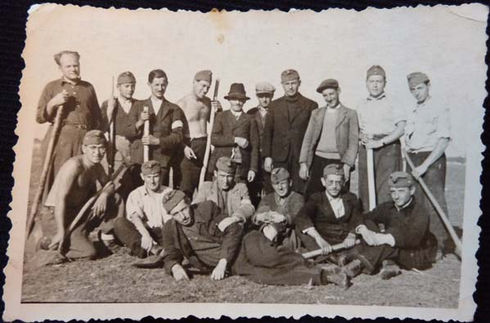I'm a paragraph. Click here to add your own text and edit me. It's easy.
I'm a paragraph. Click here to add your own text and edit me. It's easy.
I'm a paragraph. Click here to add your own text and edit me. It's easy.
Latest:

Forced Emigration to Soviet Union
You can’t get things in shops in Russia, but if you’ve got any gold or silver you can buy anything. So on New Year’s Eve, Mrs Rosenberg sent her husband on a train to get her gold teeth exchanged for products, for food. And he lost them between the house and the railway station. It was a calamity, everything was just–, he lost them, they disappeared. So she sent him back. And after hours of looking he found them: they were glistening in the snow, he found them. So that was another way of surviving.
They decided that we required education. So they imported a large quantity of A Short History of the Communist Party of the Soviet Union – in Kazakh. Now there were very few people who could read Kazakh who cared about this. So we burned Short Histories of the Communist Party of the Soviet Union and I remember it had its humorous aspects.
I was about age eleven then. And I started thinking about myself: ‘Well, why is it that we lost these twelve people and the Kazakhs on the whole tended to survive?’ One of the first things I realised was the lack of fuel. We didn’t know about fuel. We didn’t have reserves of fuel. I therefore applied myself systematically to the gathering of cow dung. Morning, noon and evening I collected cow dung. I set up a cow dung pile. One of the best cow dung piles in the village. It was admired! It was beautifully done. I knew where to collect the cow dung and how to arrange it and so on. And that determined me to become an engineer which I did because in fact I came to realise that survival very much depended on actually the practical things. All the other things were not that significant; it’s the practical things - the water, the shelter, the food and so on. So I collected a large amount of cow dung and this determined me to do something practical, something that you could actually contribute to people’s living.
My mother was a magnificent woman. It became dark round about three o’clock, not that you could do much more than that because you couldn’t really go out. It was terrible gale winds all the time as well as snow. And she was very determined to educate me. We had two or three Polish books as a result of which I’ve got a very detailed knowledge of Polish poetry. Some of the books were circulating around the village - round the settlement. My mother taught me from memory, also I remember The Iliad and The Odyssey, and quoted Schiller to me and sang songs and so on, educated me a great deal. Once a day she went out to fetch water. It was a terrible expedition because the river was some distance away where the men made a hole in the ice. She wore everything, all the clothes that she had. I remember she wore my coat on the head. on the head as a form of hat. And she always reminded me subsequently that one day she came in from fetching water. And my first question to her was: ‘What’s the difference between an anode and a cathode?’
[About his time in Siberia] We were families together. But the people who were single who were sent to Siberia, they were treated very badly. Like real prisoners. I mean we couldn’t go anywhere; it was in the middle of the forest. We had no transport, no paper, no radio, we didn’t know the world existed, or anything like this. We couldn’t see at night, because of the lack of vitamins. One of the Russians said “If you get hold of a piece of liver and eat it, your sight is going to be restored.” And eventually we got hold of one, and it came back.
















